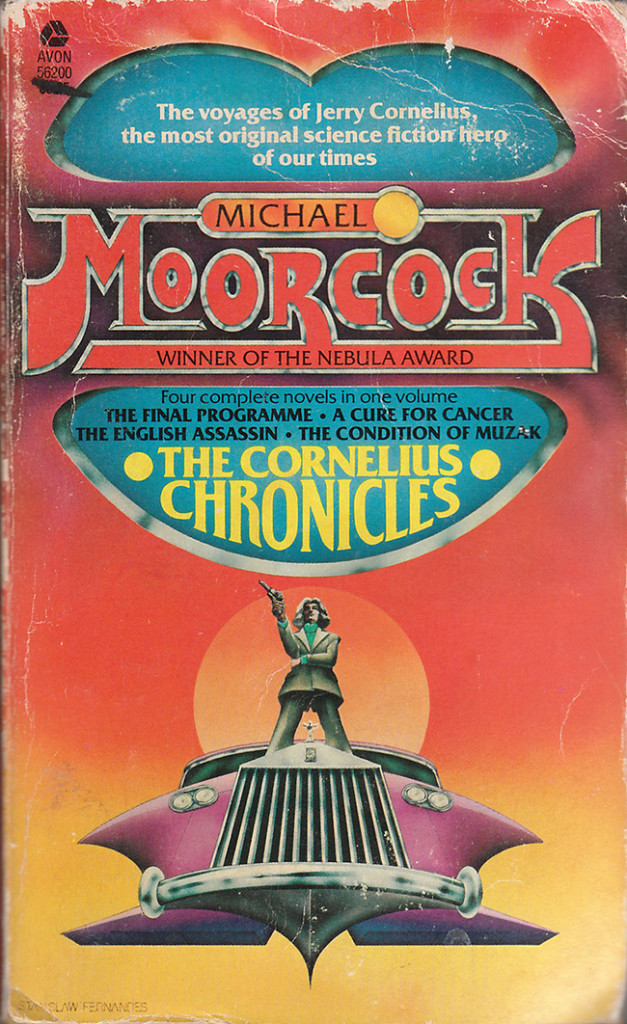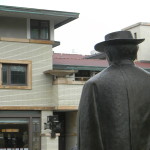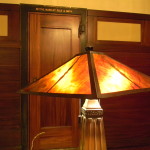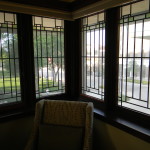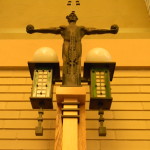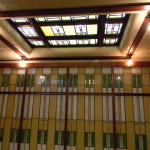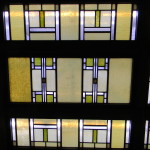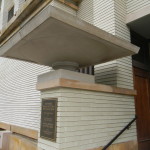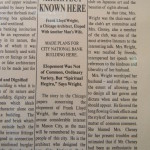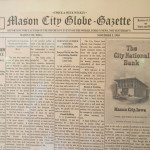Here is my interview with Davey Wrathgabar of Athens, GA bands The Visitations and Fablefactory. This was first posted on June 13, 2006, and was part of my “Liner Notes” series of interviews. (Keep the date in mind when noting the political references.)
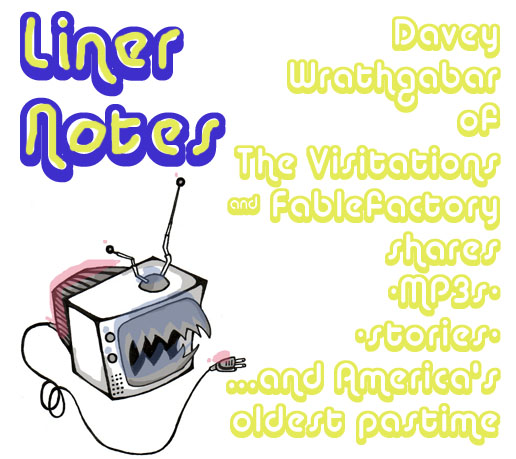
For years Davey Wrathgabar was the cold dark heart of Fablefactory; while Johnson Clark, aka Hank Wren, wrote straightforward rockers and Roxanne Martin, aka Freckles LeChat, meditated on the miracles of childbirth (“Pop Out!”), Davey’s songs told stories of twisted individuals acting upon deranged impulses, or alien abductions, or peyote hallucinations, or rednecks and backwoods preachermen. His songs, with their vivid, visceral lyrics, chart a map of the bizarre underbelly of America, but always with a wise, sardonic point of view. When Fablefactory split in 2001, Davey began releasing his solo recordings as The Visitations, first with an instrumental of the same name on the Japanese compilation U.S. Pop Life Vol. 10: Athens Experimental, then with his debut on Happy Happy Birthday to Me Records. The eponymous record seems to announce itself as a concept album about UFOs and other paranormal matters, but quickly departs the theme for stories of depraved sex, a decomposing misanthropist, and a pugilist who never lived up to his abusive father’s expectations. It’s a richly arranged collage of high concepts, haunting melodies, and thumping drumbeats. The second album, Propaganda, was a sharp turn in direction, and this time stuck to its concept: politics. Specifically, George W. Bush, but also Rush Limbaugh (who is cooked quite thoroughly on “Talkin’ Hate Radio Blues”), voting in Florida, Christianity, and other light topics. Self-released in the last presidential election year, its point-of-view has aged well, given how that election turned out. Davey took time out from working on a third Visitations album to reflect on six songs of Optical Atlas’s choosing (three from each of his bands), and to provide a pair of previously unreleased demos to throw some light on the recording process.
1) To start in Fablefactory country: “Broken Arms.” Hank Wren wrote, “Perhaps the most spine tingling and macabre song Dave has written to date.” I really love this song. If you weren’t listening to the lyrics–I suppose this goes for a lot of songs of yours–you could just get lost in the melody and miss how savage the metaphors are.
It’s a song about a relationship I had in college. We were both young and in love with each other, but had both grown up with unhappy, bickering parents. Nobody wants to act like their parents, and nobody ever realizes that they do. We had this cycle of dysfunction in common, she and I. We were really hurtful to each other. At least we can laugh about it now.
The recording process for that song mirrors the dysfunction that inspired it. Hank and I both laid down guitar on Roxanne’s drums, and our pal Dickie put a bassline on it; unfortunately we didn’t know what we were doing and it sounded lame and tinny. We thought the problem was the guitar arrangement, so we got Andrew [Rieger] and Aaron [Wegelin] from Elf Power to add two more tracks each: total overkill. And the recording still sucked. So we made a mix and deleted it from the hard drive (that’s the way we rolled back in ’97).
I decided the song must suck, because I had read a lot of books about recording and thought I knew what I was doing. Later, Chris Bishop added another track of drums, another bassline, and a piano. We threw a few more vocals just so they would be up in the mix. The song ended up as part of an outtakes lottery we used to decide which comp got which track; Happy Happy Birthday To Me got “Broken Arms.” I think it sounds pretty good, if a bit messy. At least I can laugh about it now.
Broken Arms – Fablefactory
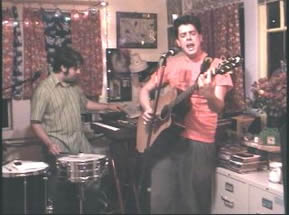
2) “Total Psychotic Breakdown.” My favorite song of Freak Out Hard On You; any comments or memories?
I wrote that one on New Year’s Day 1999. Roxanne and I almost broke up the night before. I don’t remember what set us off, but I think it was like our second argument in five years (not a sign of a healthy relationship). I guess we were unsatisfied or some such shit. We probably should have walked away that day. Case in point: I turned the episode into a big joke of a song. Are we singing “I need dope, I mean,” or “I need dopamine?” What I really needed was to write an honest tune or keep my goddamn mouth shut. What’s good for rock is often not good for girlfriend. This might be doubly true if girlfriend rocks. Every time we’d play it live, I could just feel Roxanne seething behind me on the drums. Luckily, although we didn’t realize it at the time, we were working on a whole album about dysfunction. My only regret is that I didn’t freak out a little harder.
Total Psychotic Breakdown – Fablefactory
3) “Navajo Peyote Song.” The definitive peyote song. A singalong.
I had a Native American pal in high school who was into all sorts of psychedelics. He was from Minnesota, and definately not Navajo. He was really just another suburban kid, but we recruited him as our shaman. He’s the inspiration for the character Enis, who actually appeared in a few other tunes that shall never see the light of day. We were also into conspiracy theorist and sci-fi author Robert Anton Wilson back then. The Mescalito reference in the song is from his nonfiction Cosmic Trigger Vol I. The singalong part is from a field recording of a “real” Navajo peyote song. You can hear it trail off at the end of the song. I had lost the unlabeled cassette my friend had made me by the time Fablefactory was recording. There was a boombox demo of the song that had a piece of the cassette hastily pasted onto the end, so we sampled it.
The real song fits with the chord progression of my song, but I’ve always regretted the way the words ended up sounding like “Hey Oh Way-O-Yanna Wanna Way Hey-Yo.” The real thing sounds so differently. I tried like heck to find another copy of the recording, or another recording of a peyote song. I e-mailed all sorts of academics who blew me off. I really wanted to make the refrain accurate and to get a translation. I figure it means “I’m tripping my balls off.”
Navajo Peyote Song – Fablefactory (demo)
Navajo Peyote Song – Fablefactory (completed version)
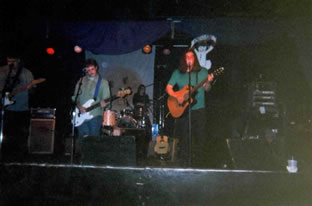
4) On to The Visitations: “It’s Superstition.” More hyperbole: this song launches a pounding drum and then some of the freakiest, most thrilling noises before you start to sing. An excellent good rock song, and it sets the mood for the paranormal theme of the album.
“It’s Superstition” is about how human desire, as represented by the concept of the wishing well, causes human suffering, which in turn causes human desire. I think I make a pretty strong case for the reality of the cause-and-effect relationship. The irony is that this cycle manifests in the form of superstitions. So the trolls who live at the bottom of the wishing well are in a sense real. Their bile is the source of our hopes and dreams. We do dumb, often destructive things in pursuit of happiness.
We miss what we have lost and seek to fill the voids in our lives. As Faulkner puts it, “[we] cling to that which has robbed [us].” The line “…it’s superstition…” comes in the background vocals that mock the voice telling the story.
The evil sounds come from the classic Casio CZ-101. It’s fully programable in a way Casio never tried again. My CZ-101 is long gone, but I’d do almost anything to get another one. Evil!
It’s Superstition – Visitations
5) “Blessed Flying Object”–just lovely, this one. I like how it starts as the notes from “Close Encounters of the Third Kind” and develops into a Visitations song. But the most interesting aspect is the lyrics, which treat a close encounter with a UFO as a religious experience.
Hey, I never noticed the connection with Close Encounters before…creepy! Just kidding. “Blessed Flying Object” is also inspired by Robert Anton Wilson’s Cosmic Trigger. He writes of the UFO – BVM connection. The theory is that experiences with the Blessed Virgin Mary roughly mirror experiences with unidentified flying objects. Bright lights, levitation, wide hypnotic eyes…they seem to be markers of the same visitation viewed through different cultural lenses.
I was recording the guitar on the 4-track and ready to sing when I was visited by a kidney stone. You know how those Greys like to implant things into your sex organs. They say it’s as close as a man will ever come to giving birth. I was in labor for about a week and a half. You don’t sleep. You don’t eat. You pop pills and moan and sweat out urea.
But when it comes out of you, your whole body fills with an overwhelming sense of joy. So I sang. Later on, when I decided to use the tune on Visitations, I wanted to re-take the vocal because I originally sang into a karaoke machine microphone. But I’ll never get another take like that one, God willing.
Blessed Flying Object – Visitations
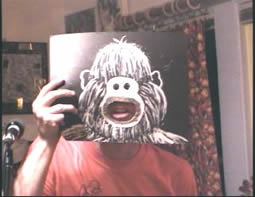
6) “Television.” I think “the world’s deaf, dumb, and blind” is an apt summary, especially for late 2004, when this album came out and Bush was about to win another election. The chorus has an interesting idea–“The world outside looks just like the television”–meaning, maybe, the world lacks depth or self-reflection.
The song started as a reflection inspired by Craig Raine’s poem, “A Martian Sends A Postcard Home.” His line reads, “Rain is when the earth is television. It has the property of making colours darker.” He didn’t mean that the television portrays the world darkly, but I always thought the Martian’s observation was apt. The original tune was really different. The words were really different, too. The Dubya cut-up was added at the last minute, more as an intro to the album than as part of the song.
The song actually began to reveal itself to me during the first Visitations tour in 2001. We were supposed to play in NYC on September 14th, if I remember correctly. Of course the show was cancelled, and we avoided going into the city. From the NJ Turnpike, though, the world outside looked just like the television. There was still that big plume hanging over the city in place of the Towers.
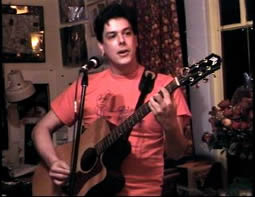
Folks were pulled over all along the right shoulder of the Northbound side. Some laid wreaths or put up signs, but I was struck by the number of people snapping photos for posterity. The photographic record seemed important to people, as if to say “I was there, I saw this destruction, from whatever distance, and can testify to its reality.” But the photographic record is bullshit, at least as manipulatable as language, just as open to interpretation as words. Everybody wanted a piece of the action. Folks in Richmond and Providence and Vermont all told us that they were supposed to be the fourth target, the intended destination of United 93. It was a great time to experience America if you love hate. Everybody wanted to be a victim to justify themselves. Nobody said “Shit, I guess that supporting despotism and genocide in the Middle East for the past 50 years must have really pissed some people off.” Ironically, the most realistic and thoughtful discussion of the events I experienced was in Arlington, VA (just a few miles from the Pentagon).
I also toured in May 2003, as the bombs started falling on Baghdad. I had already given up on the song by that point. It was too esoteric, not direct enough. But events gave them more meaning than ever. That’s how the song was transformed into a rocker. How is it that we live in a society with so much information yet so few informed people.
And I’m not just talking about folks who voted for Dubya. That week a friend told me that she hoped they didn’t find WMDs. What an awful thing to hope for, that so many people would die for nothing, or that the whole thing was just an evil conspiracy, or that American foreign policy would be irreparably damaged for decades to come. I guess it was my own perception lacked depth and self-reflection. I wonder if she visited a wishing well. Fucking trolls!
Television – Visitations (demo)
Television – Visitations (completed version)
* * *
